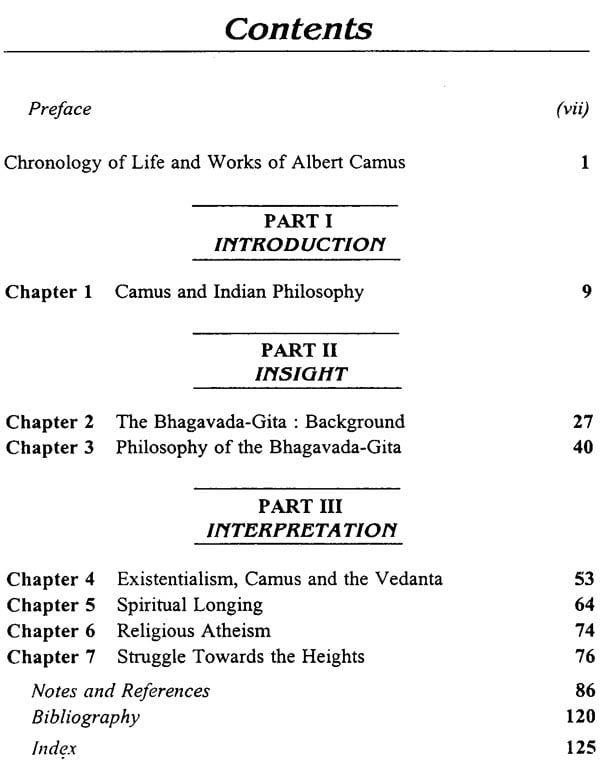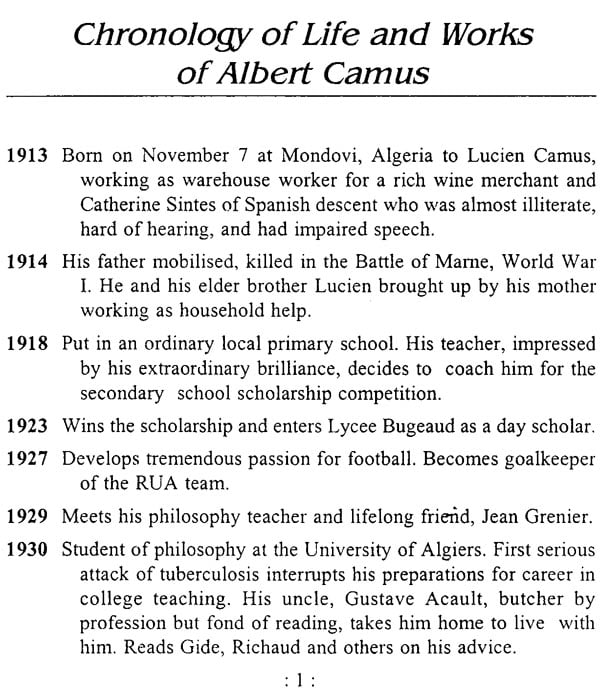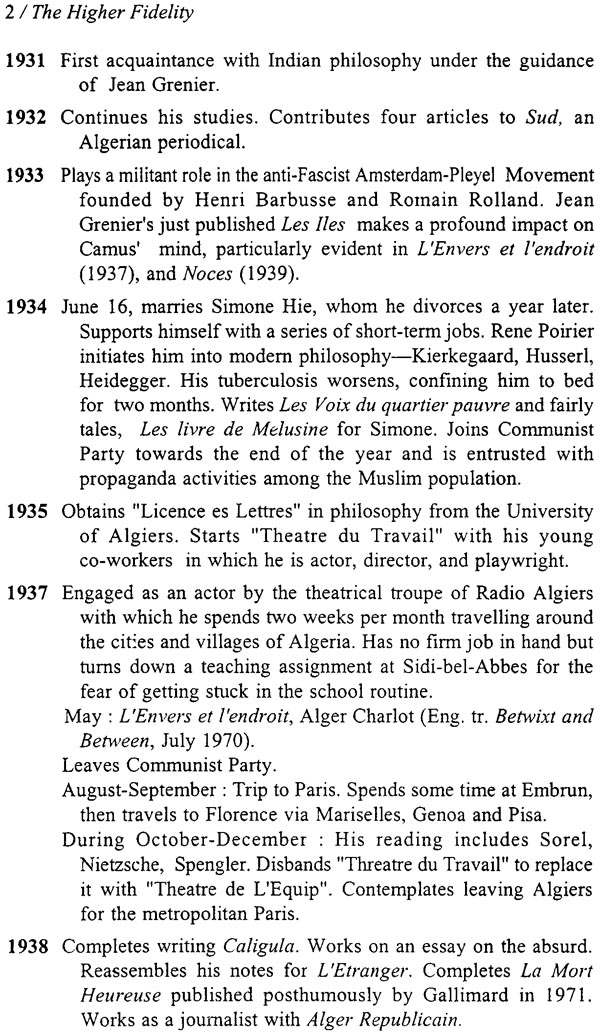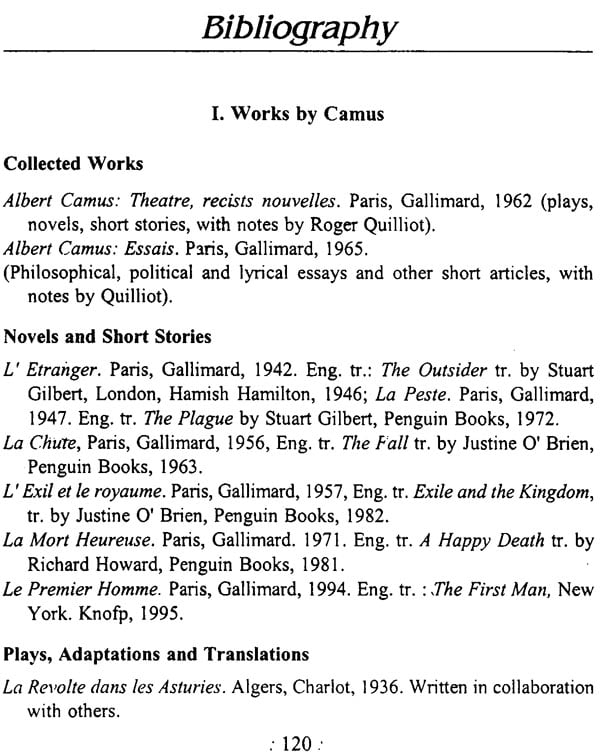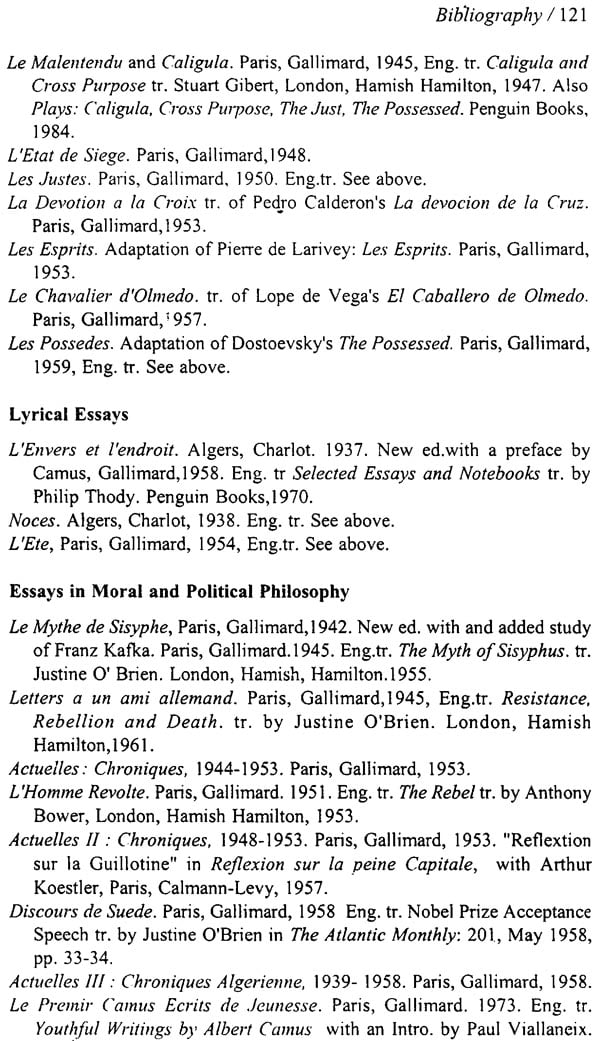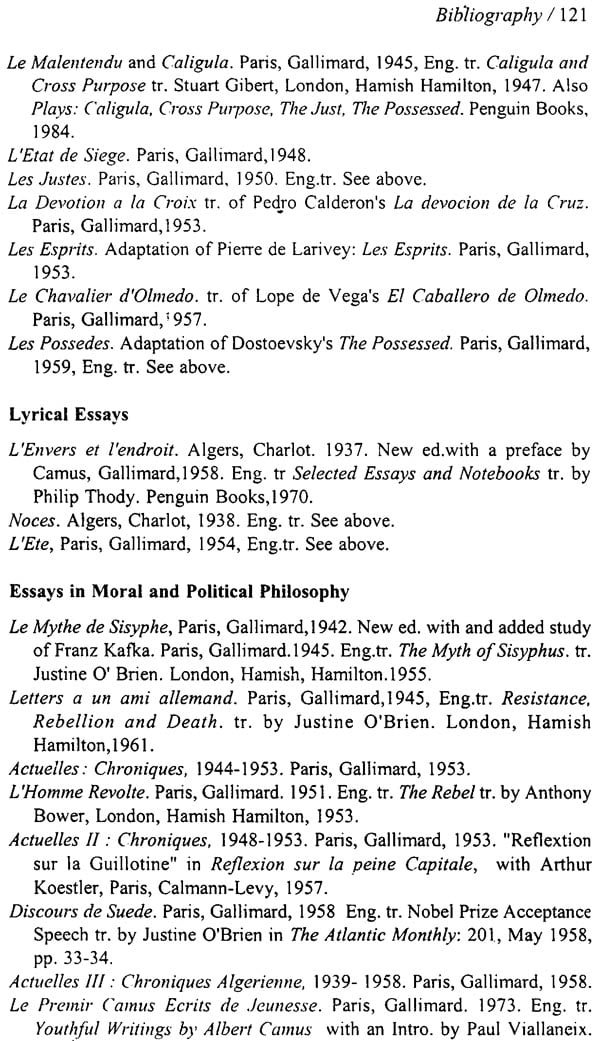
The Higher Fidelity (A Study of Camus and The Bhagavada-Gita)
Book Specification
| Item Code: | NAT403 |
| Author: | Sharad Chandra |
| Publisher: | National Publishing House |
| Language: | ENGLISH |
| ISBN: | 8121404010 |
| Pages: | 137 |
| Cover: | HARDCOVER |
| Other Details | 9.00 X 6.00 inch |
| Weight | 290 gm |
Book Description
After establishing a close relationship between Camus' thought and Indian Philosophy in her earlier two books and, in several papers on Camus the author in the present book reveals how Camus was a deeply religious man. It is a well known fact that he vigorously protested against being branded an atheist. Three main ideas dominate Camus thought : the absurdity of human condition, inevitability of death, and a constant defiant search for happiness, all these three are directly related to the Indian thought. That Camus had read the Bhagavada-Gita has been confirmed from more than one source. Keeping in mind the receptibility that Camus possessed. reading of the Gita was sufficient to lend to his thinking the characteristic Indian tinge so apparent in most of his works. The Bhagavada-Gita is the kernel of the Indian Thought and the precept laid down in it is that the higher fidelity of man is to a man and not to any outside agent or entity. This precisely is the call given by Camus in each of his writings. This exaltation of man, holding of human life as its own highest goal and raising of human effort to the height of purest religion by a writer born into Christian background is an interesting point of convergence.
Born in 1943, Sharad Chandra has a Ph.D in Comparative Literature with Camus and Indian Philosophy as her special field. Fond of writing from her student days, she published her first short story in 1960, but took up writing in real earnest while coordinating a University Diploma Course in Creative Writing at IGNOU. She has travelled widely and has participated in several seminars and conferences abroad. Her work on Camus earned her the prestigious Grand Prix du Rayonnement de La Langue Francaise from the Academic Francaise in 1992. Other distinctions include the Best Translator's Award (1993), Writer's Fellowship from the Calouste Gulbenkian Foundation, Lisbon (1995) and Resident Translator's Fellowship from the Ministry of Culture, France (1996). Equally at home in Hindi and English, Sharad Chandra's poems, short stories and articles have appeared in various Indian and foreign periodicals and anthologies. She has translated several French and Portuguese writers and poets in Hindi.
Her original published works include
• Albert Camus and Indian Thought
• Camus and India
• The Visit and Other Stories
• Albert Camus ?et L’Inde
She also has to her credit two story collections and one poetry collection in Hindi. She is at present on the Guest Faculty of IMI, New Delhi and is Senior Resource Person, Value Education Workshop aided by Ministry of HRD, Government of India, New Delhi.
The closeness of Camus' philosophy to Indian thought struck me many years back. The reading of The Outsider almost always reverberated with the echoes from the Kathopnisad. Other writings offered other affinities. Once I gathered enough facts to substantiate my impression and presented this aspect of Camus' thinking in seminars held in India and abroad on Camus and also published two books on the subject. The idea caught on. Three main ideas dominate Camus' thought-the absurdity of human condition, inevitability of death, and a constant, defiant search for happiness, the first two notwithstanding. There is suffering but "there are more things in men to admire than to despise". Camus' angle was always optimistic. He had an un-flinching faith in man's ability "to create, all by himself, his own values". Life was absurd but revolt surpassed absurdity, and struggle led to happiness. These concepts of absurdity, unintelligible suffering, death, as well as those of revolt and happiness are directly related to Indian thought. For, the Indian philosophy or Hinduism as it is generally referred to in the West is not a historical religion like Christianity or Islam. It is a self-propelled, self-renovating, perennial system continuing forever the fundamental ideals conceived by the visionary thinkers millions of years back.
The precept laid down in most of the Indian religious and philosophical books, especially The Bhagavada-Gita, is that the higher fidelity of man is to a man and not to any outside agent or entity. This, precisely, is also the call given by Camus in each of his writings although in a much more vehement, aggressive manner as was characteristic of him. This exaltation of man as man, holding of human life at its own highest goal, and raising of human effort to the heights of purest of religion by a writer born into a Christian background attracted me as an interesting point of convergence meriting research. The Higher Fidelity is the outcome of that undertaking.
I have divided my book into three sections. The first part states the subject in a long introduction, the second briefly summarises the basic concepts of Indian philosophy, its nine systems underlining the difference in their individual approaches. The third part systematically examines the premised analogy, points out its distinctness from the western philosophical understanding, highlighting the influence of the Upanisadic thinking on that of Camus.
Besides the ideological similarity between the Outsider and the Kathopnisad, there are reiteration of ideas and concepts from the Gita in the Plague. Tarrou, the saint without God, is a true `karmayogi' in the Gita terminology. He has a lucid mind and a compassionate heart. Then there are Camus' philosophical reflections on ignorance, desire, and happiness-happiness as the main goal of human life, and struggle as the only way to reach it. This is his monk-like insistence on chastity, inner purity, and his very peculiar sense of the sacred, his nostalgia for spiritual union, his view on truth, non-violence, religion and God.
Contrary to the general impression about him, Camus was a deeply religious man. It is not unknown how vigorously he protested against being branded as an atheist. In these four chapters, I have also tried to answer questions like why was Camus' thinking so different from that of the other writers of his age, and at what juncture the Indian thought entered it-how, and to what extent.
The Higher Fidelity was prepared at the request of the Editions Balland from Paris who published the French version in 1995. I am happy that the National Publishing House, New Delhi is now bringing out the English edition. I hope the book shall prove useful in establishing the Indian link in the essential philosophical beliefs of Albert Camus.
**Contents and Sample Pages**
